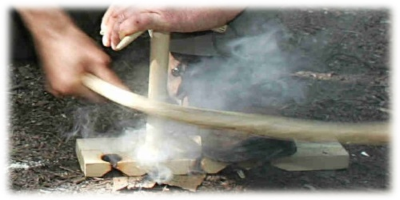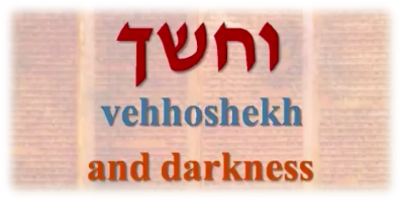Those who have been following my work with the translation of the Torah have probably noticed an evolution of how I translated some Hebrew words. In order to demonstrate this evolution, let me use Genesis 1:1 as an example to show how my research and my translation evolved over the years.
In my published translation of The Torah: A Mechanical Translation, Genesis 1:1 is translated as, “In the summit Elohiym shaped the skies and the land.” But for many years, prior to the translation's publication, I translated this verse as, “In the summit Elohiym fattened the skies and the land.” And for a short time it was, “In the prime Elohiym fattened the skies and the land,.” In this article I will explain how the translation of this evolved over the years.
Summit
The Hebrew word behind this translation is the word ראשית (reshiyt). While this word is translated as “beginning” in most translations, we first need to recognize that this Hebrew word does not solely mean “beginning,” which becomes evident when we look at how this word is translated in other passages of the Bible, which include: first, chief and best.
When translating and defining a Hebrew word, there are several things to keep in mind.
The Root Word
Every Hebrew word comes from a root word, which will help provide the background to the meaning of that word from a Hebraic perspective. In the case of the word reshiyt, it comes from the root word ראש (rosh) meaning “head.” Therefore, the definition of reshiyt will have something to do with a “head” of something, such as the “head” of a mountain, or its “summit.” It could also be the “head” of a time, or “beginning,” or the “head” of a group, such as a “chief” or the “best” of the group.
Abstract vs. Concrete Words
The Ancient Hebrews preferred to view the world through concrete concepts, which is in stark contrast to the abstract concepts that we commonly use in our Western languages today. Let me use the words “kneeling” and “blessing” to demonstrate. If I asked you draw a picture of both of these words, could you? It would be fairly simple to draw a picture of someone “kneeling,” but the word “blessing” would be very difficult. Therefore, “kneeling” is a concrete word, but “blessing” is an abstract word. In Hebrew, the word that is translated as “blessing” is the verb ברך (barak) and literally means “to kneel.” The Ancient Hebrew culture includes a lot of kneeling, bending and prostrating and in fact, there are many different words for different forms of showing respect to another. Literally, the word barak means “to kneel down,” such as what one would do to show respect to another, but this word can also be used figuratively in the sense of doing something nice to another person, hence the translation “blessing.”
When we look at the word reshiyt, I prefer to translate Hebrew words with a more concrete meaning and “summit” is a much more concrete word than “beginning.” In addition, the English word “summit” does have the definition of, “the highest state or degree,” which can be descriptive of a “chief” or the “best” of something.
Space and Time
Hebrew words used for “space” are also used for “time.” A good example of this is the Hebrew word עולם (olam), which is often translated as “world” (space) and “age” (time). Another example is the word קדם (qedem), which is often translated as “east” (space) as well “ancient” (time).
When it comes to the word reshiyt, which is clearly used for “time” (beginning), we can also assume that this word can have a meaning within “space,” hence my translation of “summit.”
The Mechanics of this Translation
It is clear that the Hebrew word reshiyt could be translated a multiple of ways; beginning, first, chief, summit and I have also considered the words “prime” and “origin.” While all other translations will choose the best English word to translate a Hebrew word in a given passage, this is not possible in the Mechanical Translation, which will always translate each Hebrew word the same way every time it occurs, which will allow the reader to know that wherever this English word appears, it is always the same Hebrew word.
Therefore, I had to choose “one” English word to translate the Hebrew word reshiyt. However, if the reader believes that “summit” is an inaccurate translation, this is not a problem because of the nature of the Mechanical Translation, which allows the reader to know that every time he sees the word “summit” he knows that this is the Hebrew word reshiyt and can assume his own translation for this word.
This is not possible with other translations. For instance, we know that in the King James Version, which uses the word “beginning” for the Hebrew word reshiyt in Genesis 1:1, we cannot be certain what Hebrew word lies behind the word “beginning” in other passages, such as in Genesis 13:3, which uses the word “beginning” for the Hebrew word תהלה (t’hil’lah).
Elohiym
Why do I transliterate the Hebrew word אלהים (elohiym) instead of translating it as “God” as other translations do? Because the Hebrew word elohiym does not mean “God.” In Exodus 9:28 this very same word is translated as “mighty,” which is the literal meaning of this word. However, this word is used as a name for God, and in the Mechanical Translation all Hebrew names are transliterations of the Hebrew.
Shaped
Almost up until the publication of The Torah: A Mechanical Translation I had translated the Hebrew verb ברא (bara) with the English word “fattened.” So, let me first explain my reasoning behind the original use of the word “fattened” in my translation.
Fattened
According to most theologians, the word “create” is understood to mean “to make something out of nothing.” This definition is an abstract concept with no concrete foundation and therefore could not have been a Hebraic concept. In Genesis 2:7 it states that God “formed” man. The Hebrew word translated as “formed” is the verb יצר (yatsar) and is best understood as the process of pressing clay together to “form” an object, such as a figurine. We can plainly see from this verse that man was made from something, therefore the Hebrew word bara in Genesis 1:1 cannot mean “to make something out of nothing.”
If the word bara does not mean "create" then what does it mean? By examining other passages where this word appears, we can begin to uncover its true meaning. In 1 Samuel 2:29 this same verb is translated as “make yourselves fat,” so this word will have something do with “fattening.”
When an animal is chosen for the slaughter, it is placed in a pen and fed grain so that it can be fattened, or "filled up." This idea of "filling up" is now more relevant to the next verse, Genesis 1:2, “Because the land was empty and unfilled.” Also, with a better understanding of the word bara we can now see its meaning in Genesis 1:27, “And Elohiym filled (bara) the man with his image, with his image he filled (bara) him, male and female he filled (bara) them.”
The Hebrew word translated as “image” in the passage above, is צלם (tselem) meaning an outline of a shadow, a representation, or image, of the original. Once God “formed” the man, he “filled” him with a representation, an “image,” of himself.
Shaped
Then, in my research I came across the verb ברה (barah), which is very closely related to the verb ברא (bara), the verb used in Genesis 1:1 and discussed above. But before I go into the meanings and relationships of these two verbs, let’s examine another two verbs that are very similar, the verbs קרא (qara) and קרה (qarah).
Hebrew lexicons define the Hebrew word qara as “to call out” and the word qarah as “to meet.” However, both of these verbs can, based on the context, take on the meaning of the other verb. I am of the opinion that both of these verbs mean “to call out to meet with,” but qara focuses more on the “calling out” while qarah focuses more on the “meeting.” However, there are instances where qara, according to the context, means “to meet” and qarah is used for “calling out.”
In the same way, the verbs bara and barah mean “to shape by fattening,” such as is done when an animal is “selected,” another meaning of the verb bara, for an upcoming feast and is fed grains that will “fatten,” or “fill,” it up. But the verb bara focuses more on the “fattening” and barah focuses more on the “shaping.” However, just as the verbs qara and qarah are used interchangeably, so may bara and barah. While Genesis 1:1 uses bara (fatten), it is not impossible that the verb barah (shape) is meant, but recognizing that the idea “to shape by fattening” is still the meaning of both verbs.
The entire chapter of Genesis one is about the “shaping” and “filling” of the creation, such as is described in my article, The Chiastic Structure of Genesis 1.
The Skies and the Land
Most translations translate the end of Genesis 1:1 with “the heavens and the earth.” Both of these English words imply meanings that are not present in the Hebrew. The Hebrew word שמים (shamayim) literally means the “sky,” which is a meaning of the English word “heaven,” but “heaven” also implies the realm of God, which is an understanding of the word that is not present in the Hebrew. In the same way, the word “earth” implies the whole of the earth, but this word more literally means “land,” often in the context of a “region” or “district,” not the entirety of the earth. Because of this, I use the words “sky” and “land” for these Hebrew words.
Like what you’re discovering? Continue the journey from Bible reader to translator.Resources
Community
Study Tools
Masterclasses
Webinars
Live Classes





